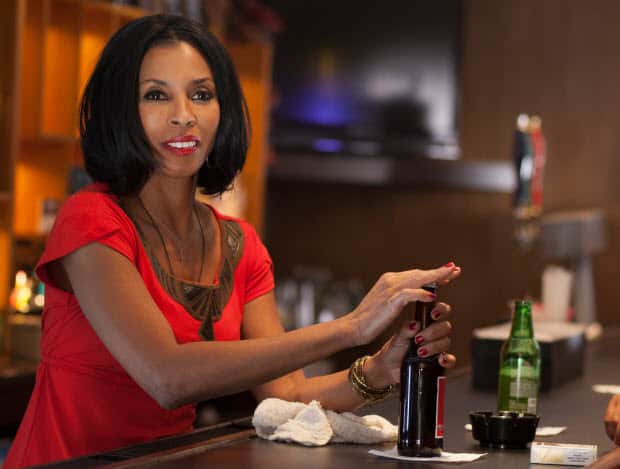
For four seasons, Treme‘s shown us a world fighting against itself to grow, to pick itself up by its bootstraps and rebuild after Hurricane Katrina, FEMA and their backwards programs be damned. And for thirty-five beautiful episodes, the friction between those maintaining the “way things were” (the musicians, dirty cops, and preservationists like DJ Davis) and those fighting for the “way things could be” (the gang-infested wards backed up against expensive new big-dollar development projects). That dissonance remains apparent in “… To Miss New Orleans”, Treme‘s 77-minute series finale, but it’s a very, very different hour of Treme, one that suggests New Orleans doesn’t need to tear itself apart from the inside or try to redefine itself in the post-storm world. It’s an episode full of unbridled hope, even in the face of the very real threats (both those in suits and packing handguns on the corners) still remaining in the historical city, ending a dark season (and series) on a number of emotional high notes.
At its heart, “… To Miss New Orleans” is an episode exploring the idea of rebirth, pushing many of its characters into the next phase of their life: Davis “grows up” a little, Annie and Terry leave New Orleans, and Delmont begins a family, among the many other people of New Orleans going through a number of big personal and professional changes. Using a large number of short scenes, “… To Miss New Orleans” muses on conveying the “evolution of consciousness” in Buddhist texts, where ‘rebirth’ doesn’t necessarily constitute the death of one’s biological body, but a constant evolution of how one approaches and reflects on their own life and way of living.
DJ Davis and Big Chief have always been the philosophical hearts of Treme — and with Big Chief getting his final sendoff in the opening scene, “… To Miss New Orleans” leans heavily on DJ Davis to carry its message of starting anew. For some, this might make the finale a little less memorable: flashbacks to the early, Davis-heavy episodes of Treme are a reminder of what made it such a niche show to begin with — but I think David Simon and Eric Overmeyer balance it well, doing what feels honest to Davis in normal, annoying fashion, while still giving Steve Zahn a showcase to portray the growth Davis has gone through over the years (“I want to be full-time in life” he tells Janette at one point in the episode).
Treme‘s exploration of rebirth really hits home in some of the lesser-explored subplots: Delmont showing just how much of Big Chief’s son he is (becoming a father in the house they built together, refusing to leave New Orleans for good), while showing just how hopeful it can be to expand beyond what we know and love to reach for something more – something we also see with Annie, though her imminent struggles in Nashville giver a bleaker forecast for those trying to rebuild themselves in a falsified image of who they think they are. If there’s one place we can’t make compromises, it’s inside ourselves: without that inner faith, there’s never going to be hope for any kind of real change.
But even in a hopeful hour full of new marriages, new babies, graduations, and Mardi Gras, “… To Miss New Orleans” is a twisted reminder of how we’re often slaves to who we once were. The corruption of New Orleans will continue on, with or without the building of a new jazz center or cleaning house at the precinct, where Toni’s case finally brings down some of the corrupt New Orleans police officials, with the help of the FBI (but not really Terry, who leaves town to find a fresh start with his boys in Indianapolis). The city of New Orleans is fighting to find a new image for itself, one that rejects the traditional social institutions and celebrations for something more monetized — a selling of the soul that Treme equates to Annie’s journey for self-definition, a journey that’s ultimately doomed to fail. Our reputations and images often haunt us, and “… To Miss New Orleans” is keenly aware of that — and manages to balance its everlasting bleakness with the comfort of the city’s soul: its music.
As long as the music remains, New Orleans is going to be OK: there are always new sounds to find, new places to hang, and next year’s Mardi Gras to start stitching a costume together for. As humans, we constantly feel the need to change and evolve — something that is definitely necessary, but never without losing sight of who or what something is. Music is the heartbeat of New Orleans — and despite the commercialization, cuts to public funding, and social friction threatening it, will always remain a part of the city’s identity, no matter what it might try to change itself into in the future
In the end, Treme’s positivity doesn’t cloud the realities ahead for many of its characters — and fortunately, “… To Miss New Olrleans” doesn’t have a whole lot of time to get into the darker sides of what lies in the future, only stopping occasionally to reflect on the many, many challenges still lying ahead for people and their city struggling to change who they are without forgetting what once made them great. It might be a series finale, but “… To Miss New Orleans” is not an ending: it’s a quietly contemplative hour celebrating a series of new directions and fresh starts for New Orleans and the creative, lovable people living within it
Other thoughts/observations:
– New Orleans PD will conduct an “internal investigation” into corruption — in other words, the New Day Police Department Terry had once hoped for will never materialize.
– Annie drops a LOT of f-bombs in this episode.
– On his way out of town, Hidalgo promises big profits to Tim at the (never going to happen) jazz center, trading it for the rights to Janette’s name (“I gave him 100% of nothing” he proudly tells her on his way out of New Orleans for good).
– When Toni’s police friend gets mad at her for her lawsuits against the department, she kindly reminds him “I sue everyone”, and he offers her his bread pudding. My favorite little moment of the episode.
– I hope you enjoyed watching the final, truncated season of Treme as much as I did. As always, thanks for reading!
[Photo via Paul Schiraldi/HBO]
 Follow Us
Follow Us






something I couldn’t tell: who is the Big Chief in the final mardi gras scene? Is it the son, or the Wild Man?
without going back to watch the scene again, I’m pretty sure George has assumed the role of Big Chief. Delmond remains a part of the krewe, honoring his father “in his own way” by wearing his shoes rather than his crown (as he tells George earlier during their conversation at GiGi’s).
I’m going to miss this series so much… I live overseas and to watch this was a little taste of home!